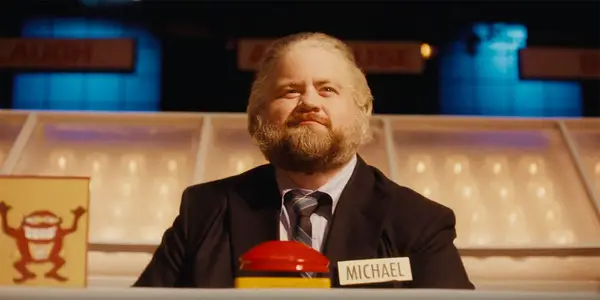Toronto International Film Festival 2024: THE LUCKIEST MAN IN AMERICA & EDEN

Wilson is a cinema enthusiast based out of Toronto, Canada.…
Stories based on true events can often take creative licenses in exploring a narrative, and the following two films exemplify the varied response of such endeavours. Samir Oliveros’ The Luckiest Man in America is a solid debut feature film, while Ron Howard‘s Eden fails to be a bright notch on the veteran director’s belt.
The Luckiest Man in America (Samir Oliveros)

Back in the 1980s, Michael Larson shocked America when he seemingly could not lose on the CBS gameshow Press Your Luck. The details surrounding his historic run, as well as the legitimacy of his tactics, have long been scrutinized, and serves as the subject of Samir Oliveros’ The Luckiest Man in America. The film is quite delightful, and showcases the endless versatility of Paul Walter Hauser as a performer.
Hauser stars as Larson, who maneuvers his way onto Press Your Luck, but proves to be more than the unemployed ice cream truck driver he poses to be. As his winnings increases at an unstoppable rate, his past is unraveled by the show’s production team (with terrific turns by David Strathairn, Walton Goggins and Shamier Anderson).
From the very start, The Luckiest Man in America is wrought with tension, which is sprinkled with hints of comedic moments, creating a fairly accessible narrative. This tendency towards accessibility ensures that the film never quite delves into the bowels of Larson’s shady past, only offering glimpses of this, while never fully interrogating it. And this glimpse of a much more complex characterization is masterfully conveyed by Hauser’s towering performance. His portrayal of subtle derangement, all while maintaining the familiarities of a typical family man, is a testament to this abilities as an actor. Amalgamating all this within a performance that also has clear comedic undertones is no easy feat, but with Hauser, it does feel rather effortless.
On the surface, The Luckiest Man in America also yearns to escape the confines of the game show format, but Oliveros ultimately resists, keeping the narrative more or less in this tightly confined space. By doing so, he maintains the film’s obsessive instincts, which is liely reflective of Larson’s internal thoughts. This ultimately proves to be both a merit and flaw, as the restricted outlook also limits his backstory to a certain extent. The film likely would’ve benefited from a larger worldview, but Oliveros seemed more interested in mirroring the narrative with Laron’s obsessive focus on a singular task.
This tunnel vision approach to narration does end up working, and Oliveros delivers a gripping and enjoyable story about a true to life enigmatic character. Unraveling more of this enigma might’ve suited Larson’s story bette in another film, but with The Luckiest Man in America, it’s a fitting approach that simply works.
Eden (Ron Howard)

While Eden is shot beautifully, and features some very beautiful people as well, Ron Howard’s latest is ultimately a misfire. Conceived with likely ambitious intentions, the film just fails to captivate in a manner befitting of bringing together such a talented cast of performers.
Based on true events, the film takes place on an uninhabited island in the Galápagos, where Dr. Friedrich Ritter (Jude Law) and his partner Dora (Vanessa Kirby) have established a life that is removed from conventional society. This is eventually disrupted when Margaret (Sydney Sweeney) and Heinz (Daniel Bruehl) hope to start a renewed life on the island as well, which is further complicated by the arrival of Eloise (Ana de Armas), a self-described Baroness.
Piecing together accounts of what actually happened during this tumultuous time, Eden uses the island as a canvas to unravel the complexities of civility and human nature. And as much as Howard et al. tries to create a nuanced examination of the film’s own central thesis, its ideologies are either overly simplistic or non-sensical. Any thread of nuance fails to fully launch into anything truly interesting.
As expected, the film is bolstered by strong performances all around, with Sweeney and Kirby, in particular, standing out amongst the ensemble. The cartoonish portrayal of a superficial and manipulative socialite from de Armas doesn’t always work, but somehow fits into this chaotic mess. Mathias Herndl does a fine job at shooting the film with an expansive lens, creating some breathtaking views of the island itself. The problem is, what’s being conceptually delivered on screen doesn’t necessarily live up to the shots themselves. Hans Zimmer’s score is also surprisingly pedestrian, lacking any signs of his signature ingenuity for some reason.
On paper, Eden could have been a thought-provoking discourse on the flaws of human nature, and had enough talent to actually pull this off. But despite assembling such a powerhouse ensemble both in front and behind the camera, the film proves to be an exercise in lost potential.
Does content like this matter to you?
Become a Member and support film journalism. Unlock access to all of Film Inquiry`s great articles. Join a community of like-minded readers who are passionate about cinema - get access to our private members Network, give back to independent filmmakers, and more.
Wilson is a cinema enthusiast based out of Toronto, Canada. He escapes from his day job by writing random thoughts about cinema on the internet. Although he has a longstanding penchant for Hong Kong cinema, he considers himself to be an advocate for Asian cinema in general. He has been attending the Toronto International Film Festival every year since 2005, and more of his work can be found on his website: www.wilson-kwong.com.












